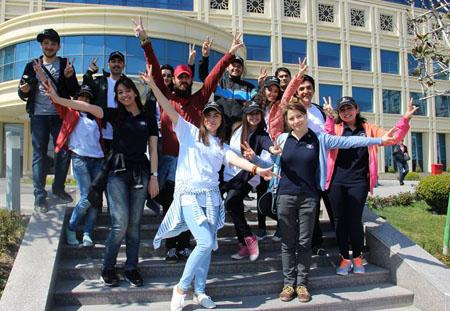You are here
Generations For Peace volunteers giving young people ‘a sense of belonging’ — Prince Feisal
By Laila Azzeh - Nov 25,2015 - Last updated at Nov 25,2015

Generations For Peace volunteers from 10 countries who took part in the fifth GFP Samsung Advanced Training at in Amman this week (Photo courtesy GFP)
AMMAN — Troubles sparked by the different religious beliefs in her homeland have prompted Zainab Naukya to launch an interfaith programme that has so far engaged 50 young people.
Utilising the power of sports to change youths’ views of others is a skill the 30-year-old woman from Uganda has acquired through Generations For Peace (GFP), a nonprofit organisation dedicated to empowering young volunteers to promote tolerance and responsible citizenship in communities experiencing different forms of conflict and violence.
“I have been involved with the GFP since 2006, but began my programme on interfaith tolerance a year-and-a-half ago. When you look at the community where I live, there are different religions and people have no respect for each other,” she said.
“Sports activities help change that. They make young people realise that they have more similarities than they think,” Naukya told The Jordan Times on Wednesday.
The activist, who in cooperation with other volunteers has trained 13 trainers, is among 39 of the “most experienced” volunteers from 10 countries who convened at GFP headquarters in Amman this week to develop their skills as peace builders, strengthen their future programmes to benefit vulnerable children, young people and adults, and transform their communities.
The gathering is part of the fifth GFP Samsung Advanced Training, which included awards for those who displayed “exceptional efforts” of volunteerism in four categories: innovation, quality, impact and sustainability.
Addressing participants and media personnel, HRH Prince Feisal, GFP founder and chairman, voiced his pride in the efforts and dedication of the volunteers, saying that they demonstrate the very core values the organisation strives to inculcate among youth.
In a time when conflicts and violence are on the rise globally, the prince underlined that the efforts of the GFP volunteers are more important than ever before.
“We see tragic violence around the world, in Beirut, Paris, Jerusalem and Hebron. In Syria, Iraq Yemen, Libya, Tunisia, Nigeria and recently in Mali and many other cities and countries,” he said.
“In this region, we are suffering from the downstream effects of the horrific violence in Syria. In Jordan and Lebanon, Generations For Peace volunteers are using the power and energy of team sport games and the creativity of art and role-plays to support refugee and host community youth to interact and build new relationships,” the prince added.
“These activities are helping refugees overcome trauma, isolation and fear. The activities build social cohesion, supporting refugees and host communities to work together, building resilience and reducing the risk of violence.”“As well as managing the downstream impacts of violence and displacement, we must also work upstream to address the causes of violence,” the prince noted.
“This is a conflict between moderates and extremists, between respect for diversity and prejudiced intolerance, between dialogue and violence,” he stressed.
“Generations For Peace programmes around the world are fostering greater tolerance and respect for diversity. They are giving youth the opportunities for leadership, significance, autonomy in decision making; and a sense of belonging to a positive peer group and collective effort delivering concrete impact in their community,” the prince said.
Referring to the values GFP volunteers are trying to teach, Prince Feisal noted that giving young people a sense of belonging is the most significant thing they do.
“… Extremists prey on giving a sense of identity.”
Globally, the UNCHR says there are now more than 50 million refugees and internally displaced people, marking the highest number of refugees since World War II, he said.
“So this is a global crisis and many other Generations For Peace programmes are also working with refugees, displaced people and host communities,” the prince added.
The volunteers have all recently completed programmes in Ghana, Jordan, Kyrgyzstan, Lebanon, Libya, Palestine, Republic of Macedonia, Nigeria, Tunisia and Uganda.
The training is also supported by the Norwegian foreign ministry.
The awards, presented by Prince Feisal and Fadi Abu Shamat, head of corporate marketing and retail for Samsung Electronics Levant Company, recognise outstanding accomplishments.
In the last eight years, the GFP has trained and mentored more than 8,900 volunteer youth leaders in 50 countries and territories in the Middle East, Africa, Asia, and Europe.
Their ongoing programmes address local issues of conflict and violence, and have touched the lives of more than 227,900 children, youth and adults.
Related Articles
AMMAN — The UN, Geneva Peacebuilding Platform, Rotary International and the Jordan’s permanent mission to the UN on Tuesday honoured Generat
Celebrating the first-ever International Day of Sport for Development and Peace (IDSDP), Generations For Peace (GFP) volunteers in 15 countries, including Jordan, led activities to demonstrate how sport can be used as a powerful tool to bridge gender, religious and ethnic divides in their communities.
AMMAN — Jordanian non-governmental organisation Generations For Peace (GFP) has been ranked second-leading peacebuilding organisation in the
















